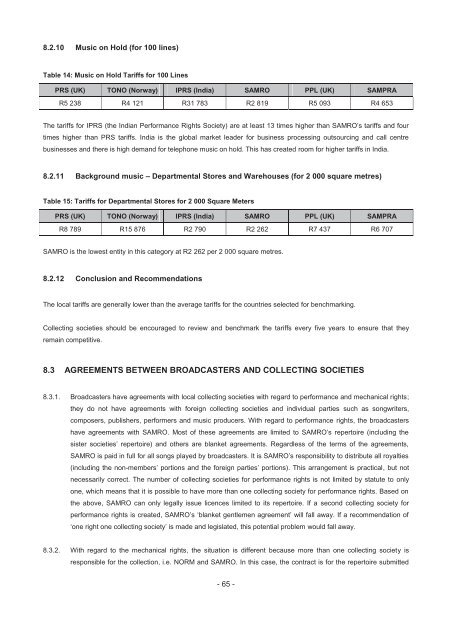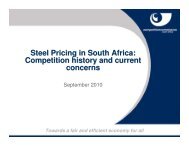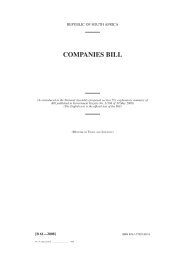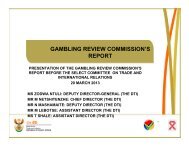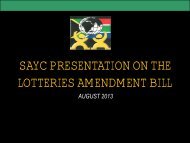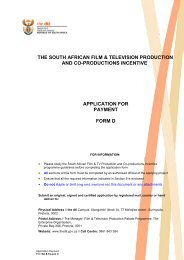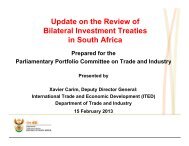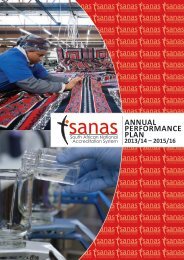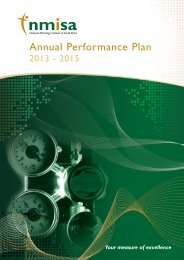Copyright Review Commission Report - ICT Law and Regulation ...
Copyright Review Commission Report - ICT Law and Regulation ...
Copyright Review Commission Report - ICT Law and Regulation ...
- No tags were found...
You also want an ePaper? Increase the reach of your titles
YUMPU automatically turns print PDFs into web optimized ePapers that Google loves.
8.2.10 Music on Hold (for 100 lines)Table 14: Music on Hold Tariffs for 100 LinesPRS (UK) TONO (Norway) IPRS (India) SAMRO PPL (UK) SAMPRAR5 238 R4 121 R31 783 R2 819 R5 093 R4 653The tariffs for IPRS (the Indian Performance Rights Society) are at least 13 times higher than SAMRO’s tariffs <strong>and</strong> fourtimes higher than PRS tariffs. India is the global market leader for business processing outsourcing <strong>and</strong> call centrebusinesses <strong>and</strong> there is high dem<strong>and</strong> for telephone music on hold. This has created room for higher tariffs in India.8.2.11 Background music – Departmental Stores <strong>and</strong> Warehouses (for 2 000 square metres)Table 15: Tariffs for Departmental Stores for 2 000 Square MetersPRS (UK) TONO (Norway) IPRS (India) SAMRO PPL (UK) SAMPRAR8 789 R15 876 R2 790 R2 262 R7 437 R6 707SAMRO is the lowest entity in this category at R2 262 per 2 000 square metres.8.2.12 Conclusion <strong>and</strong> RecommendationsThe local tariffs are generally lower than the average tariffs for the countries selected for benchmarking.Collecting societies should be encouraged to review <strong>and</strong> benchmark the tariffs every five years to ensure that theyremain competitive.8.3 AGREEMENTS BETWEEN BROADCASTERS AND COLLECTING SOCIETIES8.3.1. Broadcasters have agreements with local collecting societies with regard to performance <strong>and</strong> mechanical rights;they do not have agreements with foreign collecting societies <strong>and</strong> individual parties such as songwriters,composers, publishers, performers <strong>and</strong> music producers. With regard to performance rights, the broadcastershave agreements with SAMRO. Most of these agreements are limited to SAMRO’s repertoire (including thesister societies’ repertoire) <strong>and</strong> others are blanket agreements. Regardless of the terms of the agreements,SAMRO is paid in full for all songs played by broadcasters. It is SAMRO’s responsibility to distribute all royalties(including the non-members’ portions <strong>and</strong> the foreign parties’ portions). This arrangement is practical, but notnecessarily correct. The number of collecting societies for performance rights is not limited by statute to onlyone, which means that it is possible to have more than one collecting society for performance rights. Based onthe above, SAMRO can only legally issue licences limited to its repertoire. If a second collecting society forperformance rights is created, SAMRO’s ‘blanket gentlemen agreement’ will fall away. If a recommendation of‘one right one collecting society’ is made <strong>and</strong> legislated, this potential problem would fall away.8.3.2. With regard to the mechanical rights, the situation is different because more than one collecting society isresponsible for the collection, i.e. NORM <strong>and</strong> SAMRO. In this case, the contract is for the repertoire submitted- 65 -


